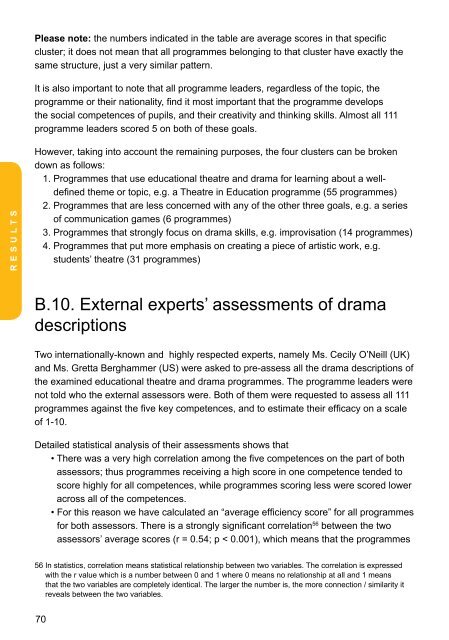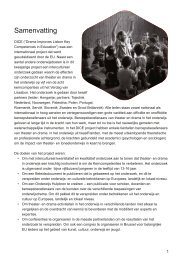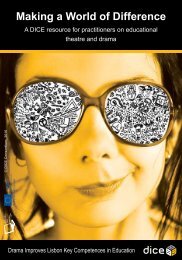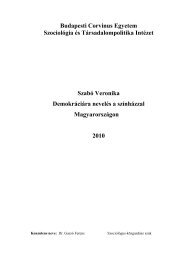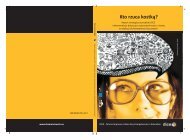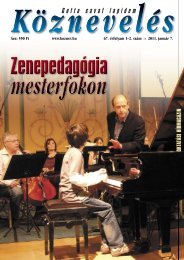Policy Paper - Drama Improves Lisbon Key Competences in Education
Policy Paper - Drama Improves Lisbon Key Competences in Education
Policy Paper - Drama Improves Lisbon Key Competences in Education
You also want an ePaper? Increase the reach of your titles
YUMPU automatically turns print PDFs into web optimized ePapers that Google loves.
R e s u l t s<br />
Please note: the numbers <strong>in</strong>dicated <strong>in</strong> the table are average scores <strong>in</strong> that specific<br />
cluster; it does not mean that all programmes belong<strong>in</strong>g to that cluster have exactly the<br />
same structure, just a very similar pattern.<br />
It is also important to note that all programme leaders, regardless of the topic, the<br />
programme or their nationality, f<strong>in</strong>d it most important that the programme develops<br />
the social competences of pupils, and their creativity and th<strong>in</strong>k<strong>in</strong>g skills. Almost all 111<br />
programme leaders scored 5 on both of these goals.<br />
However, tak<strong>in</strong>g <strong>in</strong>to account the rema<strong>in</strong><strong>in</strong>g purposes, the four clusters can be broken<br />
down as follows:<br />
1. Programmes that use educational theatre and drama for learn<strong>in</strong>g about a welldef<strong>in</strong>ed<br />
theme or topic, e.g. a Theatre <strong>in</strong> <strong>Education</strong> programme (55 programmes)<br />
2. Programmes that are less concerned with any of the other three goals, e.g. a series<br />
of communication games (6 programmes)<br />
3. Programmes that strongly focus on drama skills, e.g. improvisation (14 programmes)<br />
4. Programmes that put more emphasis on creat<strong>in</strong>g a piece of artistic work, e.g.<br />
students’ theatre (31 programmes)<br />
B.10. External experts’ assessments of drama<br />
descriptions<br />
Two <strong>in</strong>ternationally-known and highly respected experts, namely Ms. Cecily O’Neill (UK)<br />
and Ms. Gretta Berghammer (US) were asked to pre-assess all the drama descriptions of<br />
the exam<strong>in</strong>ed educational theatre and drama programmes. The programme leaders were<br />
not told who the external assessors were. Both of them were requested to assess all 111<br />
programmes aga<strong>in</strong>st the five key competences, and to estimate their efficacy on a scale<br />
of 1-10.<br />
Detailed statistical analysis of their assessments shows that<br />
• There was a very high correlation among the five competences on the part of both<br />
assessors; thus programmes receiv<strong>in</strong>g a high score <strong>in</strong> one competence tended to<br />
score highly for all competences, while programmes scor<strong>in</strong>g less were scored lower<br />
across all of the competences.<br />
• For this reason we have calculated an “average efficiency score” for all programmes<br />
for both assessors. There is a strongly significant correlation 56 between the two<br />
assessors’ average scores (r = 0.54; p < 0.001), which means that the programmes<br />
56 In statistics, correlation means statistical relationship between two variables. The correlation is expressed<br />
with the r value which is a number between 0 and 1 where 0 means no relationship at all and 1 means<br />
that the two variables are completely identical. The larger the number is, the more connection / similarity it<br />
reveals between the two variables.<br />
have been assessed <strong>in</strong> a similar way by both experts, on the basis of the written<br />
descriptions. This supports the hypothesis that the assessments are not merely<br />
subjective but also have an objective component.<br />
• While one assessor scored on the full scale (1-10), the other used only the upper<br />
half (5-10). However, although us<strong>in</strong>g a different score range, they both dist<strong>in</strong>guished<br />
between better, weaker and average programmes.<br />
• For each drama programme, the assessors were asked to estimate their confidence<br />
<strong>in</strong> the accuracy of their assessments on a scale of 0-100. The average score of<br />
the programme correlated strik<strong>in</strong>gly highly with confidence <strong>in</strong> the assessment (A<br />
expert: r = 0.82; p < 0.000; B expert: r = 0.91; p < 0.000). So the more detailed the<br />
description was, the more confident the assessor felt about it and the higher the<br />
score she gave it. It is important to learn the lesson that <strong>in</strong> case anyone wishes<br />
to present a drama programme to an external assessor (e.g. when apply<strong>in</strong>g for a<br />
grant), a detailed description is highly beneficial.<br />
Ms. Cecily O’Neill has submitted a report, which provides a valuable qualitative<br />
complement to the quantitative results. We reproduce extracts from it below.<br />
Estimat<strong>in</strong>g the efficacy of so many different drama and Theatre <strong>in</strong> <strong>Education</strong> programmes<br />
has been an <strong>in</strong>terest<strong>in</strong>g and challeng<strong>in</strong>g task. The descriptions provided by the teachers<br />
and facilitators have varied enormously – from a few l<strong>in</strong>es to several pages, and allott<strong>in</strong>g<br />
a numerical value to the work based on these descriptions was difficult at times. But the<br />
complexity of the research design should ensure that other measures and observations<br />
will produce sound and constructive research f<strong>in</strong>d<strong>in</strong>gs.<br />
Generally, the results are unsurpris<strong>in</strong>g. Because drama is essentially a dialogic form,<br />
drama activities are likely to promote verbal and social <strong>in</strong>teraction. Scores on the first of<br />
the six competencies under <strong>in</strong>vestigation – communication <strong>in</strong> the mother tongue – are<br />
generally positive. In drama, participants listen and respond. They express, appreciate<br />
and <strong>in</strong>terpret their own and others’ feel<strong>in</strong>gs and reactions with<strong>in</strong> the safety of hypothetical<br />
situations. There is a freedom to these verbal exchanges that is unlike regular classroom<br />
<strong>in</strong>teractions.<br />
The same is true of the third competence. Participants<br />
<strong>in</strong> drama negotiate and communicate with each<br />
other, <strong>in</strong> small and large groups. They adopt<br />
different roles and perspectives, as they explore<br />
different viewpo<strong>in</strong>ts <strong>in</strong> the drama. Collaboration is<br />
essential, as is the need to overcome frustration<br />
and approach complex tasks constructively. It is<br />
almost <strong>in</strong>evitable that social competence will be<br />
promoted through the work. It is worth po<strong>in</strong>t<strong>in</strong>g<br />
R e s u l t s<br />
70<br />
71


